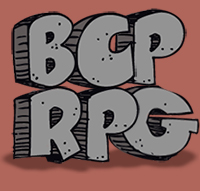BCPRPG
Beeks' Cherry-Picked Role Playing Game
Part 3: You Must Die, I Alone Am Best!
Initiative
When combat begins, the players will roll for initiative. Roll 1d20+DEX to find your initiative. In the case of a tie, the player (or monster) with the highest DEX will go first. In case that is ALSO a tie, the players (or GM) will play Rock Paper Scissors.
Attacking
To attack, roll 1d20 and add your STR if it's a melee attack, or your WIS if it's a ranged attack. If the total is equal or greater than your opponent's Armor Class, you have successfully hit your opponent and now may roll for damage. A natural 1 on the d20 is always a failure, and will result in some sort of mishap befalling the roller. A natural 20 will allow you to double your damage roll.
Attacking From Behind
Attacking an opponent from behind gets a +2 attack bonus.
Cover and Concealment
Running out in the open to fight someone is great and all, but sometimes you need to hide. Cover is a hard physical object that protects you from being attacked, be it a pillar, a trench, a brick wall, etc. Concealment is anything that would make you harder to see (such as fog, hiding in a bush, hiding behind a curtain) but will ultimately not stop an arrow or sword from hitting you. When trying to attack someone in cover or concealment, you must take a penalty to your attack roll. For concealment, the penalty is anywhere from -1 (25% obscured) to -4 (90%). For cover, the penalty is between -2 (25% obscured) and -8 (90%).
Please note that unless otherwise stated, magic spells must also adhere to cover and concealment rules.
If I Shoot My Ranged Weapon Into a Scuffle Involving a Fellow Player Character and an Opponent, Do I Run the Risk of Hurting the Player Character?
No, UNLESS you crit miss. The only people who like those 'firing into combat' rules are GMs with a chip on their shoulder.
Look man, I know it's more realistic to potentially hurt your buddy, but that shit suuuuuuucks! It sucks in D&D, it sucks in Warhammer 40k (okay 40k doesn't even give you the option because it's "too risky" BUT STILL), and it would suck here too. But hey, if you're into that, feel free to houserule this away.
Combat Maneuvers
Shove, grapple, attempt to disarm, trip... that sort of thing. Combat maneuvers are in two parts:
- First, make an Attack roll against the target's Armor Class.
- If you fail at this, the target hits you with a basic melee attack. Fail or not, you still go onto the next step.
- Next, make an opposed ability score check. If you succeeed, the maneuver occurs.
- Roll STR for shoving and grappling.
- Roll DEX for everything else.
- Your opponent will roll STR or DEX, whichever is better.
Sundering One's Own Shield
A player can choose to sunder their shield to reduce incoming physical damage by 1d12. However, this means you no longer have a shield.
Damage
When your attack successfully hits, you roll for damage. The damage depends on the item you're using. Remember, if you roll a nat 20, you do double damage.
Being Attacked
When an opponent goes to strike a player, the opponent needs to roll equal or above the player's Armor Class.
Reaching 0 HP
When a player is brought to 0 HP, they are unconscious. In each of the next succeeding rounds, 1 additional (negative) point will be lost until -5 is reached and the PC will approach the Black Gates. Consider this bleeding out or some other variant of fading away.
This is from D&D 2e. I changed it from -10HP to -5, because between this and the Black Gates I don't want it to be too easy to die and come back. I don't have the nostalgia for playing TTRPGs and constantly dying, but I also want death to be a very real thing that could happen to any character.
Black Gates and Last Breath
When a character reaches -5 HP, they are approaching the gateway between life and death. Have the player describe what their character's Black Gates look like. Then, roll 2d6 with NO modifier (Death cares not how strong or charming you were in life) for their Last Breath.
- On a 10+, you have cheated death. You are again conscious and at 1 HP.
- On a 7-9, Death will offer you a bargain. You may take it and be brought back to 1 HP, or reject Death's offer and pass beyond the Black Gates.
- On a 6-, your fate is sealed.
Dungeon World's Black Gates is possibly my second-favorite thing from that game, but it's always bugged me that the GM describes what the Black Gates look like. I feel like each character's Black Gates should be different, as each person has led a different life.
We'll All Be Laughing With You When You Die
You failed your Black Gates roll, or rejected the reaper's hard bargain. You are dead. There's no coming back from this one. No coming back to your 'normal' state, anyway. It's said in whispers that Necromancers have the ability to make dead flesh walk again, but the resulting abbaration could hardly be called 'normal'.
Sometimes, dead is better.
When you die, your party may loot your corpse for anything they consider useful, including but not limited to actual parts of your body.
You may roll up a new first-level character as soon as you die, but keep in mind this character will only be added to the party when the characters take time to rest and refresh.
